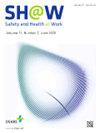Psychological Well-being Interactively Affected by Long Working Hours and Caregiving Activities
IF 2.9
3区 医学
Q1 PUBLIC, ENVIRONMENTAL & OCCUPATIONAL HEALTH
引用次数: 0
Abstract
Background
Long working hours and caregiving responsibilities are prevalent in many societies. These demands can lead to stress and adverse mental health outcomes. This study examines the associations of long working hours and family caregiving on psychological well-being and their interactions among South Korean wage workers.
Methods
Using data from the Korean Working Conditions Survey, this cross-sectional study involved 33,063 participants. Long working hours were categorized as 40 and 52 hours a week, and caregiving was assessed through self-reports of non-work-related caregiving activities. The World Health Organization Well-Being Index was used to measure psychological well-being, with Poisson regression models analyzing the associations and interactions between working hours, caregiving activities, and psychological well-being.
Results
The prevalence of low psychological well-being was significantly higher among individuals with both long working hours and caregiving responsibilities than among those with either or neither stressor (adjusted prevalence ratio = 1.81; 95% confidence interval: 1.42–2.31, multiplicative scale = 1.32; 95% confidence interval: 1.00–1.73).
Conclusion
This study highlights the significant mental health implications of combining long working hours with caregiving responsibilities in the Republic of Korea. The synergistic interaction between these factors suggests that interventions and policies aimed at reducing work-related stress and supporting caregivers could have substantial benefits for mental health.
长时间工作与照顾活动对心理健康的互动影响
在许多社会中,长时间的工作和照顾的责任是普遍存在的。这些需求可能导致压力和不良的心理健康结果。本研究考察了韩国工薪阶层中长时间工作和家庭照顾对心理健康的影响及其相互作用。方法使用韩国工作条件调查的数据,这项横断面研究涉及33063名参与者。长时间工作分为每周40小时和52小时,通过自我报告评估与工作无关的照顾活动。采用世界卫生组织幸福感指数衡量心理幸福感,用泊松回归模型分析工作时间、护理活动与心理幸福感之间的关联和相互作用。结果同时承担长时间工作和照顾责任的个体的低心理幸福感患病率显著高于没有或没有压力源的个体(调整后患病率比= 1.81;95%置信区间:1.42-2.31,乘法尺度= 1.32;95%置信区间:1.00-1.73)。结论本研究强调了韩国长时间工作与照顾责任相结合对心理健康的重要影响。这些因素之间的协同作用表明,旨在减少工作压力和支持照顾者的干预措施和政策可能对心理健康有实质性的好处。
本文章由计算机程序翻译,如有差异,请以英文原文为准。
求助全文
约1分钟内获得全文
求助全文
来源期刊

Safety and Health at Work
Social Sciences-Safety Research
CiteScore
6.40
自引率
5.70%
发文量
1080
审稿时长
38 days
期刊介绍:
Safety and Health at Work (SH@W) is an international, peer-reviewed, interdisciplinary journal published quarterly in English beginning in 2010. The journal is aimed at providing grounds for the exchange of ideas and data developed through research experience in the broad field of occupational health and safety. Articles may deal with scientific research to improve workers'' health and safety by eliminating occupational accidents and diseases, pursuing a better working life, and creating a safe and comfortable working environment. The journal focuses primarily on original articles across the whole scope of occupational health and safety, but also welcomes up-to-date review papers and short communications and commentaries on urgent issues and case studies on unique epidemiological survey, methods of accident investigation, and analysis. High priority will be given to articles on occupational epidemiology, medicine, hygiene, toxicology, nursing and health services, work safety, ergonomics, work organization, engineering of safety (mechanical, electrical, chemical, and construction), safety management and policy, and studies related to economic evaluation and its social policy and organizational aspects. Its abbreviated title is Saf Health Work.
 求助内容:
求助内容: 应助结果提醒方式:
应助结果提醒方式:


